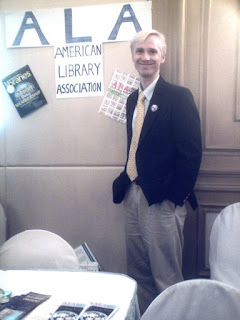Congratulations to the new librarians!
The passing rate for the Librarians' Licensure Examination is 27 percent (191 out of 699), down from 30 percent in 2009.
Below are the list of the Top 10, as well as the list of all successful examinees. Both were taken from ABS-CBNnews.com.
UPDATED 19 November 2010 to include the table detailing the passing rates for all the schools (pdf) represented at the exam. The file is from the official website of the Professional Regulation Commission (PRC). For trends during the past three years, see "The Best and the Worst LIS Schools, 2007-2009."
Top 10
ANGELINE MAY ISLA ODILAO 87.80
ALDIANE JOY BASALE AMBIT 87.05
NICOLO LORENZO TAPANG CERVANTES 86.30
MARY JANE CORTEZ MORANDARTE 86.25
IMELDA ROJAS BRAZAL 85.75
BIANCA REI TAMAYO BAYLAS 85.60
JOHANNA JAYNE SEE TACUS 85.50
IVY HONEYLOU GO CACHO 85.30
KRISTI MA FEVIE VILLAPANDO MACASAET 85.10
KELVIN BERNARDO SAMSON 84.75
Successful Examinees
ABRIGO, RYAN JOSEPH MIRANDA
ABYADO, EMMA TABACLA
AGALDANG, ROMELIN DENNISE BERNARDEZ
ALBANIA, PAMELA SALINAS
ALVARADO, CYRENE DE GUZMAN
AMAN, ERVIN JAYNAR
AMANTE, KRIZ MAE PALENZUELA
AMBIT, ALDIANE JOY BASALE
AMPOLOQUIO, ERNA SANCHEZ
ANIAG, MICHAEL LORENZO
ARANZANSO, BELINDA REPE
ARQUERO, MARICEL BUENO
ASILO, DIANA ABIGAIL ESCOBER
ASUMBRA, JENNIFER TUAZON
ATUEL, ANTHONY NERVES
BACAY, FLORENCE RENEE RUBIO
BACUS, SYLVIAN CRISTOBAL
BAGTAS, RYASMIN GAIL CRUZ
BAGUIOS, JERRY RIVERA
BAHIAN, MAGNOLIA ANGEL SEPADA
BAJO, RODERICK JABAT
BALICO, AISA REDONDIEZ
BALOCO, LORELIE AMIGO
BANAAG, LEA RINIA
BARASI, ANALYN GAMBOA
BARRO, JESSECA BERNAL
BAYLAS, BIANCA REI TAMAYO
BELMONTE, ABEL ANGELES
BERDIN, JANICE FLORES
BERTIZ, REA BASCO
BILUAN, DONNA LYN SAPAL
BOLANTE, LENI ANTUERPIA
BRAZA, HAYDEE BRETAÑA
BRAZAL, IMELDA ROJAS
BUENAVENTURA, GRACE ANN FERNANDO
BUYOCAN, KAREN MALITAH
CABILLON, CHARMANE BLASON
CABUGAO, MICHAEL REY CLEMENTE
CACANANTA, EVELYN ASPURIA
CACHO, IVY HONEYLOU GO
CADIZ, NIÑO MAR ANGELO RIGOR
CANTILERO, JERRY BARAL
CAO, DANILYN BALLESTEROS
CAPELA, MARIEGLO CIUBAL
CATAN, ROSE JASMIN BUMONGCAG
CERVANTES, NICOLO LORENZO TAPANG
CHAVEZ, PEACHIE ROSHELE TABOR
CODAMOS, JOVIE POKKIS
CRISOSTOMO, JOHN LEE GAVINO
CRUZ, HEHERSON CRUZ
CRUZ, JONATHAN ADRIANO
CRUZADO, REDEN MAGRAMO
CUARTEROS, ALMA MELAD
CUIZON, VANIZA CODO
DAGURO, HAIDEE LOU DACANAY
DAVID, MA LARA PATRICIA ARELLANO
DE GUZMAN, MA GRACIA RAE LUBIANO
DE LOS SANTOS, CHERYL SY
DE TORRES, CONNIE BAGSIT
DEL CAMPO, ROY RABINO
DELA VEGA-JUAN, MAGANA ALIX
DIJOS, SHENALY WATIMAR
DIONISIO, MELANIE FERNANDO
DIZON, EDITHA JACOSALEM
DOMINGO, JOSELITO DELA CRUZ
ELNAR, LEOREINA LOU SABATER
ESCOBER, LOVELYN BO
ESPEDIDO, RUBY ANTONNEITTE PAGLINAWAN
ESPINO, ARRIANE CRUZ
ESTRELLA, JENALYN MAGRACIA
EVA, MARK ANTHONY ESTRADA
FELIZARDO, GLENDA FIESTADA
FERNANDEZ, EMMELOU JOY OGATIS
FERNANDEZ, RENALYN SALUSOG
FERNANDO, JOSE TOMASITO NATIVIDAD
FLORO, MARTIN FELARCA
FOMEGAS, IRISH MAY TUMAPANG
FRAGATA, RONNIE BAWAS
FRONDOSO, THERESA MAE LABISTE
FRUEL, GILBERTO EUGENIO
GABO, CHRISTIAN CLARK IAN BLANCO
GAJES, HONEYLYN CALUB
GALANG, APRIL ARCILLA
GANIPES, BRODERICK TAO-EY
GARAIS, ANGELA CARIÑO
GARCIA, JOANNARIE CAPISTRANO
GARCIA, RAFAEL LAYOC
GENON, RONILO JR BESINAN
GEVERO, VENNA JANE DENOY
GLORIANI, JUDY ANN CAYSON
GONZAGA, SHEILA MAE PAGBILAO
GUILLERMO, RYAN GIL EDPALINA
HABAN, KLARIBEL PERALTA
HALCON, ALVIN ESCALDERON
HERNANDEZ, MA CHRISTINE SIDERIA
HERNANDO, RONIE SALMORIN
HERRERA, GEEMEE CAMILLE NUYLAN
IBASCO, MELANIE DIALOGO
IBUYAT, JUVY CALLEJAS
ICO, MILDRED SANTA ANA
IGNACIO, DAPHNE DUTERTE
IMPERIO, FLORIDA MAGANA
JIMENEZ, GISELLE MACAHILIG
JUAYANG, CHING BEE BORRO
JUNSAN, ARIANNE LIGAYA
LAROMBE, MARIA CARINA ALPARITA
LATIYAN, RHODORA BATUNA
LEIDA, LUNA MAY DEFENSOR
LEJANO, VERONICA JANE BALUGO
LEONCIO, JENNIFER RAMOS
LINDAYAO, JENNILYN ESTORQUE
LIWADEN, DELNA CARAMTO
LLAMAS, RECHY SUMALILENG
LOPEZ, ISABEL DINAH GARCIA
LUBATON, SWEET BONNIEBE MACEDA
LUZURIAGA, MA ROSELLE SUPERLATIVO
MABALOT, ADALIA LAGRIMAS
MACARASIG, OPALYN DIMAYUGA
MACASAET, KRISTI MA FEVIE VILLAPANDO
MALANOG, GINA LIMSAN
MAMA, ABUBAKAR SARANGANI
MANALO, CHARMAINE ANCELLA BAJETA
MANTALA, LIZA LORAINE BALANAY
MARIANO, RANDOLF DIONISIO
MATTI, LADY BERNICE GUSTILO
MEDINA, VIRGILIO JR GUINTO
MELGAR, SHERRYL ANNE JIM ARCABAL
MELU, ANGELICA GARAY
MERCURIO, HAZEL CRUZ
MIGUEL, JUNELITA MANGALI
MIJARES, RISA OPERIO
MIRANDA, CAROLYN DACILLO
MORANDARTE, MARY JANE CORTEZ
NARIO, ELVISA ESTRELLADO
NERI, CAROLYN TAMAYO
ODILAO, ANGELINE MAY ISLA
OJALDON, ERWIN ROY TALEON
OLIVERIO, ORLANDO JR LLABAN
OMONES, ANGELICUM REYES
OREGANO, LORELIE AMALLA
ORNILLO, MICHELLE PULA
ORUGA, VENUS BOYER
OSMA, MARIA AIMEE MARIBOJOC
PANOTES, JULIUS EDEJER
PASCO, SHARON GABITAN
PASTRANA, LEILANI PACIS
PEREZ, JENNIFER TOLEDO
PEREZ, KAREN JOAN BOMPAT
PLANAS, FE REMEDIO
POMAY, SARAH JANE BOMBANE
PONCE, VINAMAR AQUE
PROTACIO, EMMANUEL KRISTOFFER ROSIL
QUEROBINES, CATHERINE CALOGCOG
RAMIREZ, CRISELDA ANNE BAUTISTA
RAMOS, EUGENE GUTIERREZ
RAMOS, JEREMY CO
REAS, WITTY MAE DELA CRUZ
REQUINTA, LOURDES REBULANAN
RETAZO, MELODY ANINO
REYES, CECIL TENCHAVEZ
REYES, GAECELLE ESGUERRA
REYES, JULIUS ROMIL ONRADA
RICAFORT, MARISA CASTRO
RICO, MARIE PAZ GANIBAN
RIMANDO, RUVILYN TAMANG
RIVERA, CHRISTIAN JASPER BARROGO
SAMSON, KELVIN BERNARDO
SAMULDE, JOENECIO KALI
SANTILLAN, KAREN YANES
SAQUILABON, MARIA TERESA RUMAGUIRA
SEBIANO, JERLIE BOLISLIS
SEÑA, ROXANNE NICOLE
SIAZON, MELISSA ANNE AQUINO
SIBAYAN, CARL BRYAN WIDWIDAN
SIGOT, SHAILA SIANO
SOMERBANG, HELEN MOG-AW
SUPAN, RAEL BARTOLOME
TACUS, JOHANNA JAYNE SEE
TADINA, MARLINE PEÑAFLORIDA
TAGACAY, MARY JANE RAMIREZ
TAGLE, ALGEAN BAGHARI
TEJANO, ROSEVILLA ALINSUNORIN
TOLENTINO, CHIARA RICA TAYAWA
TUQUIB, RODELIA MERINA
UMADHAY, DARYL JUSTIN PEREZ
UMADHAY, VINCENT BRYAN LAVILLES
VELASCO, FREDERICK GERONA
VERDE, CONCORDIA BAUTISTA
VILLADORES, MC NIÑO RABAGO
VILLAPANDO, LYVIA ALMANZA
ZANORIA, EVELYN BUHAYAN
Performance of Schools in Alphabetical Order








